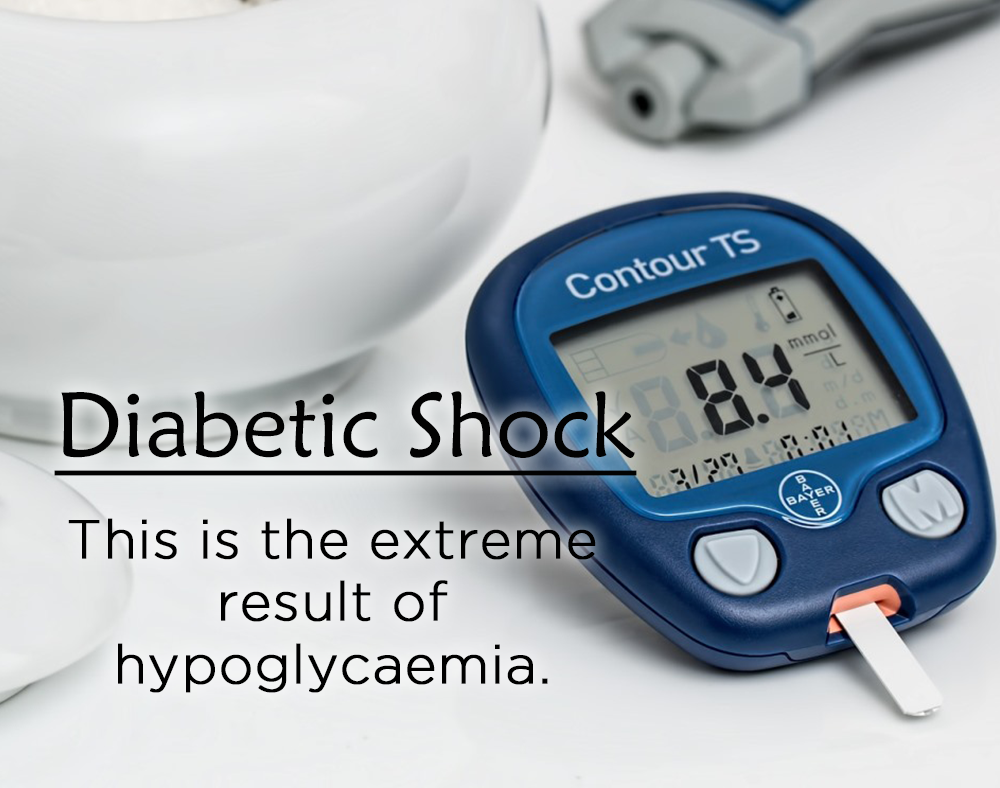Note: this article has been updated in June 2023.
What is Diabetic Shock?
Simply stated, diabetic shock is the extreme result of hypoglycemia. It is almost always due to excess insulin in the system because of medication. For this reason, it mostly affects type 1 diabetics, however there are circumstances where some type 2 diabetics require insulin.
There are also some non-insulin medications that can cause some level of hypoglycemia. Type 2 diabetics in these circumstances are therefore at some risk of suffering from hypoglycemia, and ultimately, diabetic shock.
I came across an article from Diabetes Self Caring which explains in great detail diabetes and diabetic shock in an article called what to do if someone experiences diabetic shock.
Insulin, Glucose and Diabetes
When you eat or drink anything that contains carbohydrates, those carbs you consume are converted into glucose. Glucose is a sugar-fuel your body uses as an energy source for cellular function in many different bodily processes.
Insulin is a hormone that your body releases in response to glucose being made available because of digesting the carbohydrate, facilitating the correct usage and/or storage of the glucose.
Having type 1 diabetes means you don't produce enough insulin. If you have type 2 diabetes, your cells are not able to respond to insulin efficiently.
In either case, there is a problem with this important hormone and how it helps you regulate a healthy blood glucose level. Blood glucose levels will be persistently elevated as the insulin absence or inefficiency means glucose will not be taken up by the cells that would normally use it.
Type 1 diabetics require regular insulin injections to overcome the lack, as their body does not produce it. Type 2 diabetics are encouraged to make lifestyle changes to overcome their condition, however if the condition is at an advanced stage, medication may be required. Non-insulin medications are generally applied, but in very advanced cases insulin supplementation may be necessary.
How Does Diabetic Shock Happen?
Insulin is a very powerful hormone. Type 1 diabetics learn to judge their required dosage based on their own specific variables, including diet and physical activity. However, mistakes can be made with dosage. This could be due to over-medication, poor diet, stress, illness or some other set of factors. Often it is a combination of these aspects.
If more insulin is in the bloodstream than required, glucose will be too efficiently scavenged, causing hypoglycemia. Hypoglycemia is a condition during which you don't have enough glucose in your blood.
Mild hypoglycemia can occur if you have diabetes and forget to eat after taking an insulin shot or medication. If you are physically active for lengthy periods of time and don't eat, you can also experience lower blood sugar levels. When these factors are combined, the effects are compounded.
Glucose is important for your cells to function normally. It supplies energy for multiple body processes, including brain function. Too little glucose for a brief period can make you tired, dizzy, and elevate your heart rate. You could experience mild hunger or aggression, and mental confusion.
If your hypoglycemic condition has gone on for an extended period and has not been attended to, you risk experiencing diabetic shock. This can lead to seizures, unconsciousness and sometimes a coma. This degree of hypoglycemia has the potential to cause permanent damage or impairment.
The major point here is too not let the person go into diabetic shock as there are Diabetic shock treatments that you can do immediately. However remember It is always better to prevent than to treat.
Did you enjoy reading this post?
I hope you enjoyed reading this post. If you did please use the buttons below to share with family and friends you think may benefit from the information in the post.
What do you think? Do you agree or not?
If I can answer any questions or if you an opinion that you would like to express, please let me know your thoughts by leaving a comment below.



0 comments